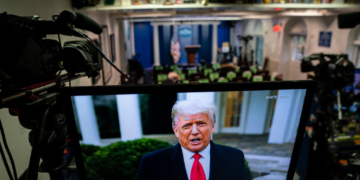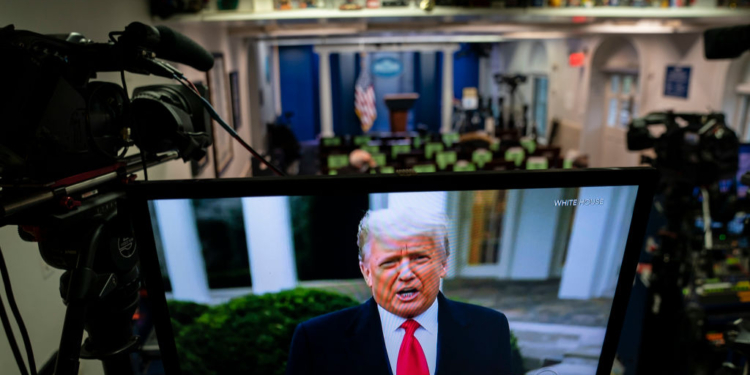When then-President Donald Trump was told his vice president, Mike Pence, was being evacuated on Jan. 6, 2021, for his safety, he said just two words in response.
“Who cares?”
That’s according to a filing by special counsel Jack Smith that was unsealed Wednesday by U.S. District Judge for the District of Columbia Tanya Chutkan, Fox News reported.
The 165-page filing is regarding the election interference case against Trump. It included several update allegations.
Part of the filing includes new information about the relationship between Trump and Pence in the waning weeks of Trump’s presidency.
In the filing, Smith wrote about a call between the president and vice president on Nov. 7, 2020, when Pence allegedly “tried to encourage” the then-president “as a friend.” Pence told Trump he “took a dying political party and gave it a new lease on life.”
During a private lunch on Nov. 12, 2020, Pence encouraged Trump, “Don’t concede but recognize the process is over,” according to the filing.
Pence also told Trump on Dec. 21, 2020, “not to look at the election ‘as a loss – just an intermission.'”
However, during the Jan. 6, 2021, riot on the U.S. Capitol, Trump seemed unphased when updated on Pence’s safety that day after Pence chose not support Trump’s attempt to stop the certification of the election.
An unnamed aide “upon receiving a phone call alerting him that Pence had been taken to a secure location… rushed to the dining room to inform the defendant [Trump] in hopes that the defendant would take action to ensure Pence’s safety,” the filing read.
After the aide delivered the news, Trump just “looked at him and said only, ‘So what?'” Smith wrote.
Smith also argued in the filing that Trump is not immune from prosecution for his alleged role in overturning the 2020 election results.
The U.S. Supreme Court ruled earlier this year that a president is immune from prosecution for official acts.
“Although the defendant was the incumbent President during the charged conspiracies, his scheme was fundamentally a private one,” Smith wrote in the filing. “Working with a team of private co-conspirators, the defendant acted as a candidate when he pursued multiple criminal means to disrupt, through fraud and deceit, the government function by which votes are collected and counted — a function in which the defendant, as President, had no official role.”
The Supreme Court’s decision in Trump v. United States ruled Smith could not prosecute Trump for the president’s alleged use of the Justice Department to delve into unproven claims of widespread voter fraud in the 2020 election.
In response, Smith filed an updated indictment revising the allegations against Trump.
“None of the allegations or evidence is protected by presidential immunity,” Smith wrote.
“He extensively used private actors and his campaign infrastructure to attempt to overturn the election results and operated in a private capacity as a candidate for office,” Smith wrote.
“To the limited extent that the superseding indictment and proffered evidence reflect official conduct, however, the Government can rebut the presumption of immunity because relying on that conduct in this prosecution will not pose a danger of intrusion on the authority or functions of the Executive Branch,” he added.
Trump has pleaded not guilty to all charges brought against him by Smith.
Smith also put forth a “factual proffer,” which alleges Trump “resorted to crimes to try to stay in office” after losing to President Joe Biden in the 2020 presidential election.
“With private co-conspirators, the defendant launched a series of increasingly desperate plans to overturn the legitimate election results in seven states that he had lost—Arizona, Georgia, Michigan, Nevada, New Mexico, Pennsylvania, and Wisconsin,” Smith wrote in the filing.
“His efforts included lying to state officials in order to induce them to ignore true vote counts; manufacturing fraudulent electoral votes in the targeted states; attempting to enlist Vice President Michael R. Pence, in his role as President of the Senate, to obstruct Congress’s certification of the election by using the defendant’s fraudulent electoral votes; and when all else had failed, on January 6, 2021, directing an angry crowd of supporters to the United States Capitol to obstruct the congressional certification.”
Smith alleges Trump and his co-conspirators attempted to interfere with the “federal government function by which the nation collects and counts election results, which is set forth in the Constitution and the Electoral Count Act (ECA); a conspiracy to obstruct the official proceeding in which Congress certifies the legitimate results of the presidential election; and a conspiracy against the rights of millions of Americans to vote and have their votes counted.”
A senior campaign adviser told Trump “on multiple occasions that various fraud claims were false,” Smith wrote.
“When our research and campaign legal team can’t back up any of the claims made by our Elite Strike Force Legal Team, you can see why we’re 0-32 on our cases,” the campaign adviser allegedly wrote. “I’ll obviously hustle to help on all fronts, but it’s tough to own any of this when it’s all just conspiracy s— beamed down from the mothership.”
Smith also asserted Trump and his lawyers “repeatedly changed the numbers in their baseless fraud allegations from day to day,” and “made up figures from whole cloth.”
Smith also wrote Trump “was on notice that there was no evidence of widespread election fraud in Arizona within a week of the election.” Also, Smith claimed Trump “had early notice that his claims of election fraud in Georgia were false.”
By the time Jan. 6 was on the calendar, Trump knew his “last hope” to overturn the results was “the large and angry crowd standing in front of him,” per Smith.
“So for more than an hour, the defendant delivered a speech designed to inflame his supports and motivate them to march to the Capitol. The defendant told the crowd many of the same lies he had been telling for months—privately and publicly, including to the officials in the targeted states—and that he knew were not true.”


























 Continue with Google
Continue with Google